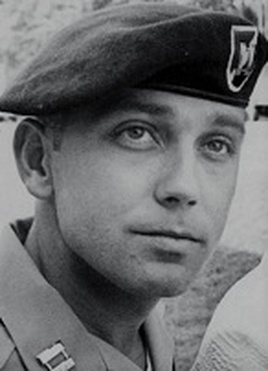
Errol Morris is a well-known documentary film-maker. His Thin Blue Line (1988) helped to free a man on death row for the murder of a cop in Texas. Many of his other works, all in interview form, were first-rate—especially Vernon Florida (1981, crazy southerners) and Tabloid (2010, Miss Wyoming 1973 and the Case of the Manacled Mormon). His short-lived TV series First Person (2000) was also very good in parts. Late in his career, motivated perhaps by something like nostalgia for his first triumph, more likely hubris, he got involved in the never-ending Dr. Jeffrey Macdonald case. The result was a book, Wilderness of Error (2010), rather than a film.
Macdonald was a Fort Bragg medic in the Green Berets. In early 1970, for reasons unknown, he murdered his wife and two young daughters, bludgeoning and stabbing them to death in a frenzy. In his version of events, hippies attacked the family and, while they chanted “acid is groovy”, murdered his wife and daughter, overpowering him in a struggle which left him with superficial injuries. If this is true then, as one observer remarked, he must have been the biggest pussy ever to serve America’s Best. Certainly the least competent sparring partner of their boxing team.
But perhaps these were not your ordinary hippie, but rather the super-fit, disciplined, martial-arts kind of hippie, considerate in their careful handing of furniture and personal effects at the remarkably tidy fight scene, even while grooving on LSD. Careful also to leave the Green Beret himself only lightly wounded, even after he had lost consciousness, despite viciously tearing into his wife and daughters. Patriotic hippies perhaps, keen not to injure one of America’s Best too seriously. Surely they were trained by MOSSAD, given that they left no evidence whatsoever of their presence: no fingerprints, none of their long hair, no blood, only the blood of the victims. Oddly forgetful hippies nonetheless, since they took none of the stash of drugs that Dr. Macdonald kept in the house.
Initially absolved by the army, whose investigation of the crime scene was by common consent lax and incompetent, Macdonald was eventually convicted in 1979 and imprisoned. He was put away in most part through the efforts of his remarkable father-in-law Freddie Kassab, whose step-daughter he had clubbed to death before staging the improbable hippie fight scene. This was a long row to hoe, but as the dogged Kassab (of Syrian descent) put it early on, “I am only 52, and I have the patience of Job”.
Ever since his conviction the doctor has filed a string of appeals and habeas corpus motions. Sometimes he has found temporary success on procedural grounds—there seem to be no end of judges willing to ignore the facts of particular cases in order to try and remake the legal system to their own liking—but ultimately he has lost where it really counted. He is still in prison, probably writing up yet another groovy demonstration of his innocence.
Before Morris dipped his webbed foot in, the case was the subject of the best-selling and distinctly damning book Fatal Vision (1983) by Joe McGinnis, adapted as a popular 1980s mini-series on TV. It should be no surprise that Morris believes Macdonald was probably innocent, though technically he claims to be merely unsure, latching on to “reasonable doubt”. He is fond of waving at the case as “incredibly complex”, which seems to be a dare to disagree with him (accepted). In so far as he has an argument, it is that the trial was unfair. Of course. The Mean ol’ Judge defense, with unlettered hick jury thrown in for good measure. It is not a very strong argument.
Morris makes no real effort to confront the prosecution evidence, the single most compelling piece of which is the undisputed fact that Macdonald’s pajama top pocket was torn after it acquired a bloodstain from his family, which is impossible to square with his (completely necessary) claim that he was fighting with the demonically effective “acid is groovy” gang when it was torn. (“Hey long-hair, you tore my PJs! Stop it!” “Far out, man”.) Certainly his murdered family members could not have torn it. There is much more forensic evidence, but that is enough on its own.
However the most interesting thing here relates not to Macdonald but to Morris himself. In taking up cases like this one can act as an historian, or at the very least that uncertain facsimile, a journalist, and attempt to weigh up the facts from a considered distance. One can at the very least first check the facts. Or one can write a brief for the defense, which is the route Morris chose, in which case every incentive is to not look too closely at the “new evidence”. In so far as there is any “new evidence” in Wilderness of Error it is hearsay at several additional removes, and it does not check out. Take the allegations by Jimmie Britt, a former marshal who in 2005 made some curious claims in serial sworn affidavits. These related to Helena Stoeckley (often spelled Stokely), a Fayetteville drug addict and schizoid police informer who had made many confessions that she was part of a hippie gang which attacked the Macdonalds. Each of which stories differed from the others—sometimes it was a satanic cult, at other times a drug ring. Each of which story the mentally-fricasseed addict retracted subsequently. That is when she was not denying that she knew or could remember anything at all about it, which is how she testified under oath at the trial in 1979. After that, Judge Dupree wanted to hear no more from Stoeckley. Macdonald has spent the rest of his life embracing this miserable phantom, and Morris follows dutifully.
Britt claimed among other things that Stoeckley was threatened by the prosecutor, hence her coyness at the trial, and that she told Britt all about the murder while he was transporting her to the trial on a long journey from out of town, where she had been marinating in a trailer, nursing an arm broken by an incident involving a tire iron. After yet another appeal and yet another hearing in 2012, by which time Britt himself was long dead, these claims could be tested. They were no tall order to refute. Britt had lied about transporting Stoeckley, basic records showed, and he was not present at discussions between the prosecutor and Stoeckley. He had in fact made two different sworn statements, so one could choose which one to read. The first had placed none other than John Edwards (the famous one, later to earn distinction of a sort) at the trial, something that could also be refuted easily. So Britt refuted it himself in a second sworn statement, at least as thoroughly sworn as the first, but only after the facts were pointed out to him. It turned out that the ex-marshal was a disturbed and embittered man with many axes to grind and spite to indulge.
Now, it is easy to see why the defense did not check up on all this, they were desperate and clutching. But any historian or even reporter worth his salt had the duty to do so. Morris did not, or he would not have embarrassed himself by appearing outside the hearing in 2012 to tell news cameras how confident he was that Macdonald would be exonerated by this dog’s breakfast. He would have saved himself the deep disappointment that he professed when it all led to exactly nothing. If there is a wilderness here, Morris is lost in it—his credibility torn to pieces by cruel thorns, which do not accept excuse notes.
The sequel to this is the engaging documentary series with the same title as Morris’ book, Wilderness of Error (2020). For once, Morris does not direct. The interviewer is interviewed, and though it takes a very long time to get around to the point, it is easy to show that there are more holes in Morris’ case than a speed limit sign outside of Lubbock TX. The coup de grace is audio from poor disturbed alcohol-pickled Helena Stoeckley recorded by private investigators in Macdonald’s employ shortly before she died in the early 1980s. By that time they had been coaching and badgering her for weeks. She describes the crime scene. It matches no known facts. Plainly she was not there. Pressed, Morris squawks out that her memory could have failed her. It was a long time ago. We all forget things. Then, as he does throughout, he argues that reality is broken! We may never found out the truth! All because of that TV series Fatal Vision! Unlike, one supposes, that film The Thin Blue Line.
When one of Alger Hiss’s more die-hard defenders was asked by David Remnick what he would do if Hiss suddenly confessed to being a Soviet agent after all, he replied that he would not believe him. Morris is well down that road.
Macdonald will doubtless die in prison before confessing. He shows all the traits of the full-fledged psychopath, especially the glibness and superficial charm, the callous disregard for anything that doesn’t further his needs. He has even acquired another wife while in prison, a (hopefully hard-headed) woman who is willing to fight his corner tirelessly. And foolishly. Morris is just another victim of that sort of folly, but Macdonald merely pulled where hubris pushed. More distasteful is Morris’ insinuation that the Fayetteville jury of Southerners who found his lost cause guilty were unlettered and ignorant. As Joe McGinnis pointed out in his riposte Final Vision (2012), the Macdonald legal team loved the jury when it was selected. It matched their polling advice (yes, they got polling advice). All but one of the jury were well-educated. As the good doctor himself noticed, one of the jurors was even a Green Beret, from Fort Bragg no less. That bond is strong! he boasted.
One further point remains. Macdonald’s chief lawyer was an oleaginous character by the name of Bernie Segal, originally from Philadelphia but later known to disport his curly chest and ponytail on the West Coast. Bernie liked to represent “civil rights” cases in an ostentatious way. McGinnis reports that Segal enjoyed brandishing a coffee mug proclaiming “your reasonable doubt … at a reasonable price”. The author, who was embedded with the Macdonald legal team during and after the trial, was astonished to discover in 2012 that the trial transcript Segal had provided him with omitted some pages which he could now see for the first time. Presumably Bernie had deliberately removed them. The pages concerned out-of-jury and public earshot exchanges between Segal and the Judge. In these the Philadelphia lawyer falsely claimed that Stoeckley was cooperating with the defense. In fact, as McGinnis knew since he was present when she was interviewed, she had refused to cooperate with the defense. Segal had responded by haranguing and threatening her. She did not budge. But Judge Dupree would put no price on this chicanery by “your reasonable doubt”. Stoeckley had already phoned the judge twice on a Saturday evening to tell him that she was in fear of her life from … Bernie Segal! And so the Judge ruled that nothing further need be heard about her.

